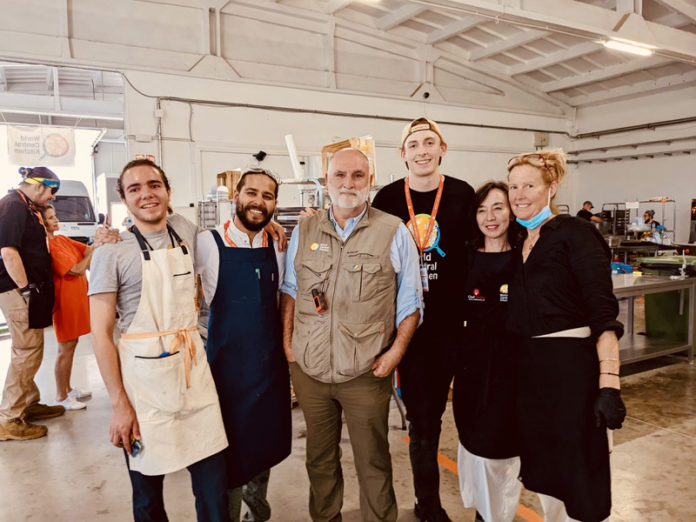
In March, not long after Russia invaded Ukraine, came notice of a GoFundMe page being set up by Rachel Vaughn, a chef I first met when I arrived on the Island just over 20 years ago. She was leaving home to fly to Poland to volunteer for World Central Kitchen, a nonprofit relief organization founded by Chef Jose Andres, who was setting up to feed millions of refugees fleeing Ukraine. Almost overnight, she raised $30,000 for charity.
A chef by trade, working both on Martha’s Vineyard and in Bozeman, Mont., Rachel arrived in Poland on March 13, and began cooking at one of the central warehouse kitchens just 10 minutes from the border of Ukraine. The kitchen was supplying food to hundreds at a nearby refugee housing center, as well as to multiple tent setups outside train stations and several other food distribution sites. She had planned to stay two weeks, but once she began working with Ukrainian volunteers and chefs from all over the world and seeing the need, it was tough to leave. She canceled her original flight home, and ended up staying well into May, nearly nine weeks later than planned. And after a short trip back to the States, she returned to Poland again, this time as a paid contractor for WCK for June and July. According to Rachel, World Central Kitchen had arrived just one day after Russia invaded to set up the very kitchen in Poland where she was volunteering, and the organization expects to stay in Ukraine for up to two additional years to help as the devastated country rebuilds.
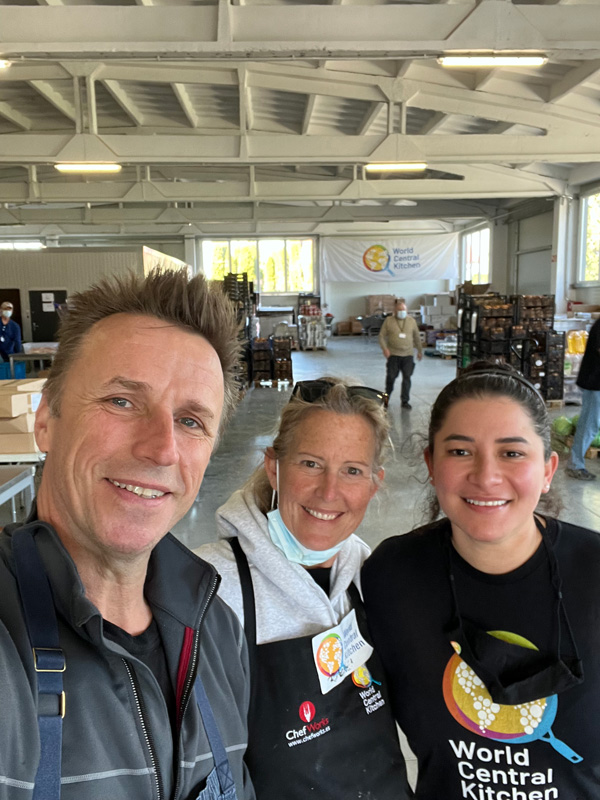
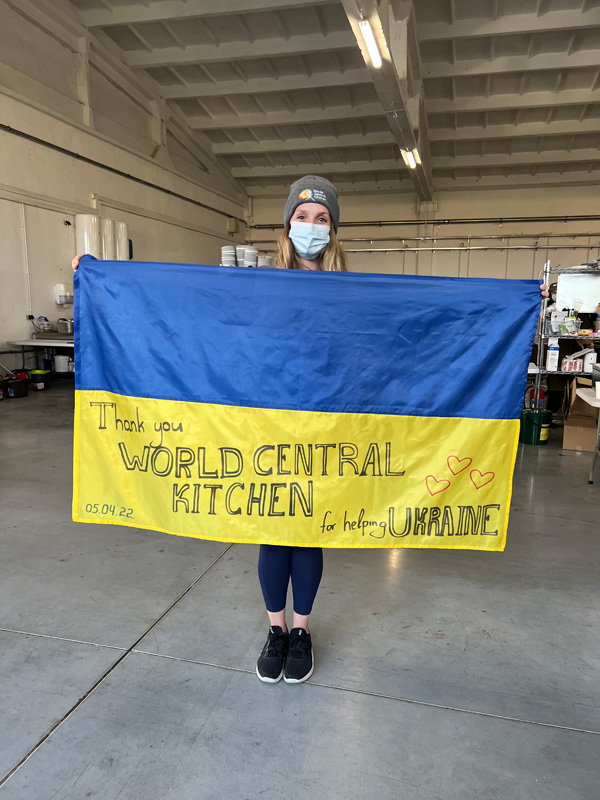
In between stirring giant vats of food in the warehouse kitchen, Rachel also connected with Ukrainian and Polish volunteers helping to settle newly arriving refugees. She helped find temporary housing for people, drove them to it, and used money she raised for much-needed supplies and clothing for Ukrainians forced to flee with next to nothing. She also traveled twice into Ukraine to meet a woman named Irinia, who had opened a shelter for families in a former monastery in Lviv. Rachel helped buy additional beds and fund upgrades to improve living conditions. “She had 88 refugee guests staying there with only one small shower, very few beds, no cots, and no washer. It’s been so rewarding to help her,” Rachel says.
Rachel describes her experience in Poland and Ukraine in this Q and A with Edible Vineyard below.
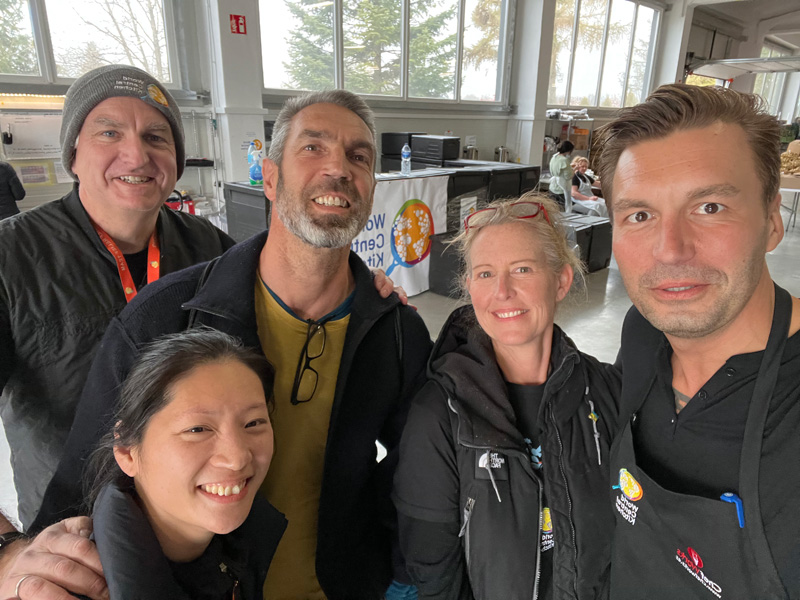
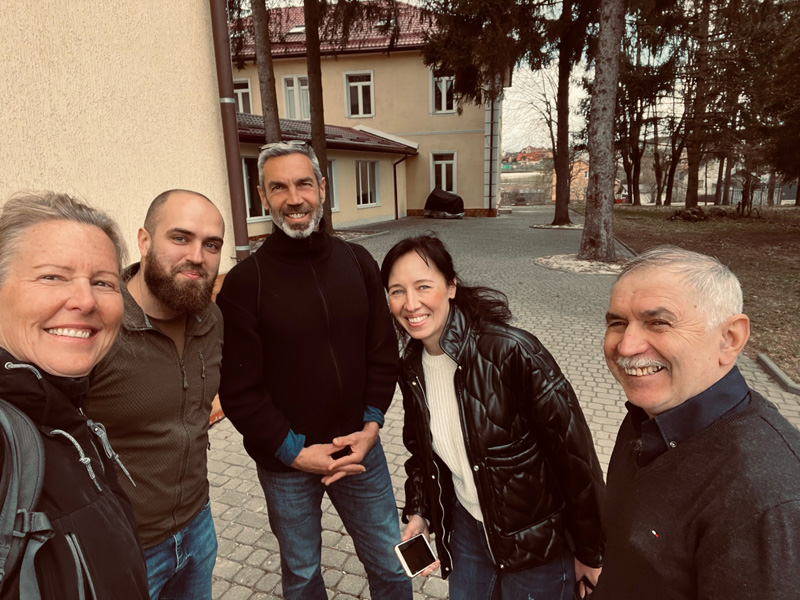
What made you decide to get up and fly to Poland to work with the World Central Kitchen?
A few days after Russia started their war in Ukraine, I felt so helpless, frustrated, and angry I couldn’t just stand by idly. I knew I needed to head to Poland and help in whatever way I could. I didn’t worry about the details, I just picked a practical date and left for Krakow.
Did you have to reach out to someone first, and what did you do to prepare to go?
As far as World Central Kitchen (WCK) goes, I signed up the best I could online. But luckily I had a small connection through a friend of a friend of a friend. My contact, the absolutely incredible 29-year-old woman Anna Bornstein, was the relief operations lead for WCK operations in Poland. I cannot help but mention the incredible work Anna has accomplished. She is an incredible human who always has an optimistic glow. For the past three years, Anna has used her degree in international development from Northeastern and her exceptional organization skills to coordinate evacuations, medical relief and food deliveries, cooking ops and COVID protocols. In my eyes, she’s the definition of a shero, and at such a young age. It’s people like Anna and the volunteer cooks from all over the world that inspire you each day while at WCK. There’s an incredible synergy that is difficult to fairly describe, it’s very powerful and addictive, actually.
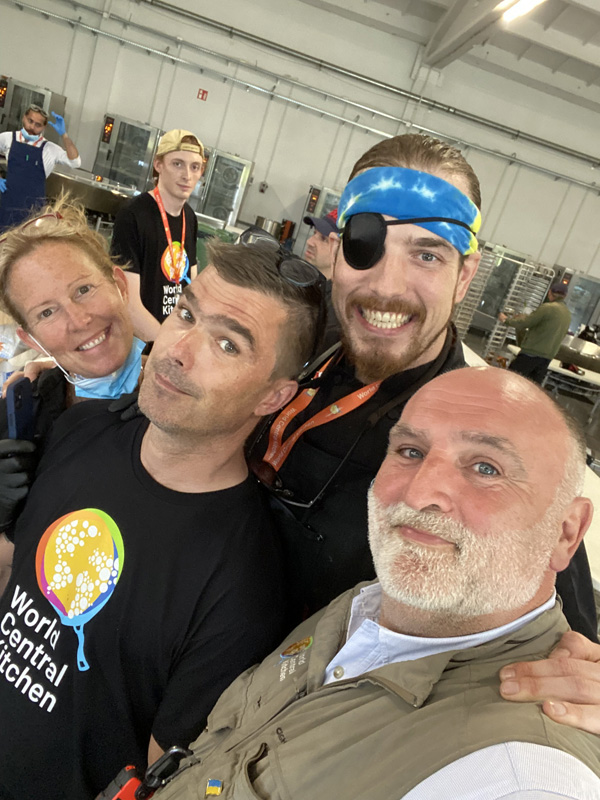
Who are some of the other cooks you are working with, and where are they coming from?
There are so many amazing humans and cooks that I had the pleasure of working with and getting to know. The volunteers varied from a young truck driver from Australia who has the quirkiest goofy and fun sense of humor you might ever meet, always making us laugh, to a celebrity chef and actor from NYC who also brought so much hard work, talent, laughter, priceless energy, and authenticity to the kitchen. [Chef Mark Murphy and actor and director Lev Schreiber.] There were young cooks who took a bus from France or Germany that came on their own dime, staying at hostels or a couch, working extra-long hours volunteering.
Some of the hardest-working in the kitchen are the logistics and coordinating Ukrainian refugees that came to help, and were quickly onboarded to full-time positions with WCK.
Where have you been cooking, and what is a typical day like for you?
I’ve been cooking in Przemyśl, Poland, in a warehouse. My days varied a bit. When I first arrived for my first three weeks, I stayed with the sweetest retiree farming couple in Rakszawa, about an hour and fifteen from the kitchen, for just $12 a night. I call Kristina my Polish mom; she loves taking care of people, and loves feeding you! Breakfasts were always plentiful, although I left too early to enjoy them. When I returned home to sleep, I would find beautifully prepared homemade pierogi waiting for me with a table setting, or homemade chicken soup with their own chicken and homegrown vegetables. Sometimes crepes, lovely Polish cheesecakes that aren’t too sweet, similar to Basque-style, with cherries baked into them, and so much lighter than American cheesecake. I was looking for a way to give her money since she refused to accept extra money for meals or laundry, so I commissioned Kristina to make cakes for me to share with the kitchen, as well as her Polish butter cookies. Everyone loved her baking.
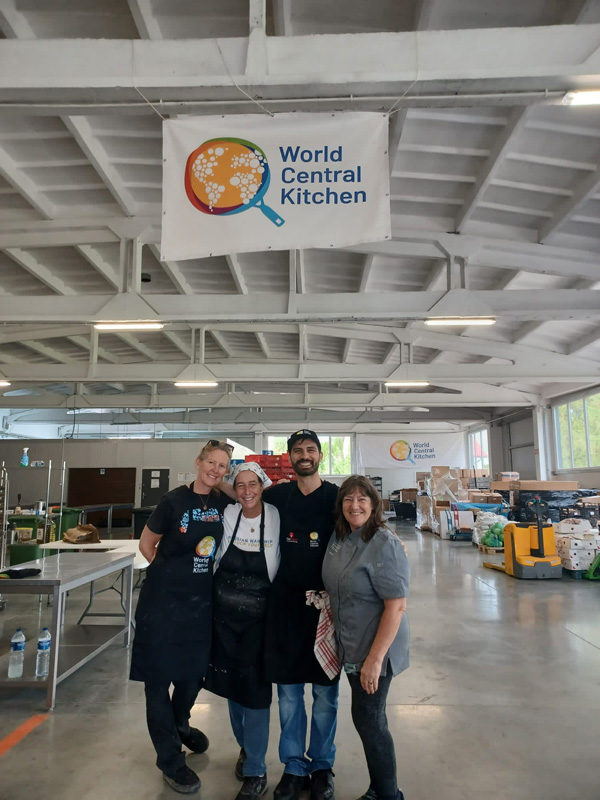
For the other six weeks, I stayed in a great apartment on the opposite side of the river in Przemyśl, which has an incredible history; the Germans were on one side, the Jewish and Polish on the other.
I still have my apartment, and will return to it this Wednesday, where I will return as a paid relief chef. I’ll be there for June and July, baking.
Take us through one of your days in the World Central Kitchen.
I would arrive in the kitchen between 8:30 and 9 and do my “grocery shopping,” where I’d grab a dolly cart and get anywhere between 30 to 50-plus kilos of flour, up to 50 kilos of sugar, 200 eggs, four buckets of sour cream, loads of butter, vanilla, etc. for whatever we were baking for the day. My goal was to bake off between 45 to 60 trays of whichever cake each day. It could be a fresh apple cake, a fresh carrot cake, a Ukrainian honey cake, chocolate orange bread pudding, chocolate cake, or my favorite, an orange olive oil cake. We also now make oat bars with honey, tahini, and chocolate chips, as well as a fresh lemon pound cake. Some days we have loads of fun making fresh focaccia for lunch, and I have to say it’s close to the best focaccia I’ve tasted. It’s our cook Kathleen’s recipe, a baker from Maine and Florida.
One of your Instagram stories says that those 2,700 banana chocolate chip cakes from one batch, cooling on racks behind you, broke a WCK record. Was that your team? Tell us about that feat.
I don’t think anyone recognized that “we broke a record,” but I did. I just thought it was wild to make a ginormous batch of 2,700 servings at once. And do it well. I added sour cream to the basic recipe and it turned into a lighter, nicer-textured, less dense banana cake instead of bread. It’s definitely a learning curve! We made a lot of banana cakes that day. We actually had 10 volunteers peeling and mashing 1,000 bananas by hand — they had fun. It was a hilarious sight. Sometimes the “cold side” of the kitchen, where many noncooks volunteer making sandwiches, etc., would often help with prep for the hot side.
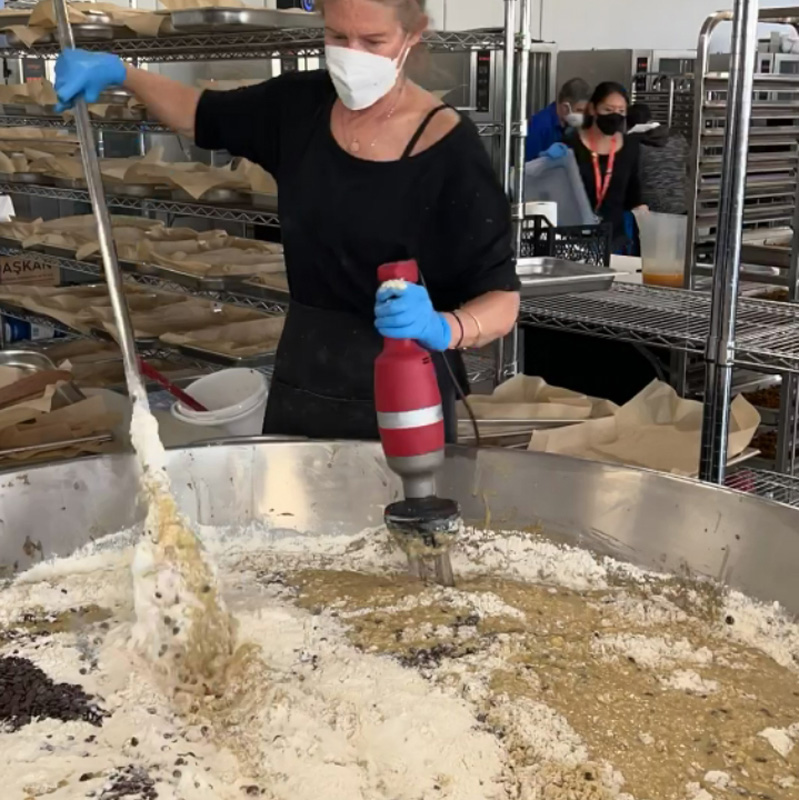
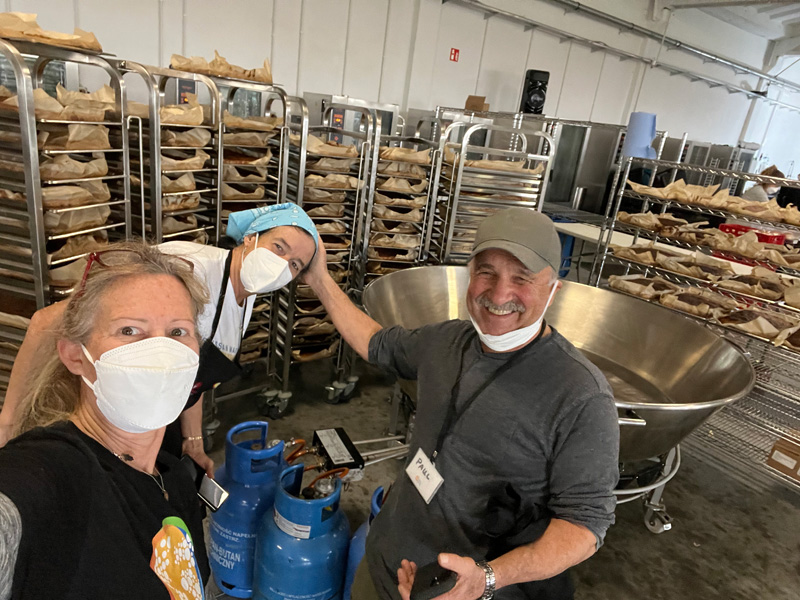
How much connection have you had with the Ukrainian people, and have they shared their stories with you?
Absolutely. The Ukrainian women working in the kitchen on HR and logistics are the heartbeat for all of us. Alina, Irinia, and Nellie. They are all from Ukraine, and are now paid WCK staff who are amazing at their jobs. Their stories and experiences we all hold close to our hearts. In the WCK family, there are so many hugs shared, and getting a hug from Alina each day makes all of our days a bit sweeter.
You had an experience where you went into Lviv, Ukraine, to help a woman hosting up to 80 mothers and children in a former abandoned school. Can you tell us a little about that?
It was probably the most meaningful thing I’ve done in a long time. I met this former Marine in the kitchen, and he had a connection, another former Marine who was working out of the center of the country of Ukraine. I started writing to him to try to find out about visiting the shelter and meeting this woman Irinia, who sounded like a hero to me. She is probably in her mid-30s, and she put this shelter together on her own. She found an abandoned old school for monks, a big sprawling building on a nice piece of land. It was really abandoned, with wires hanging out of the wall, and not much working plumbing or anything. She rounded up a bunch of townspeople to help her prepare it just enough for people to sleep there. There’s no working kitchen. The few times I went there, they were cooking out of Crock-Pots and one-burner situations. All the refugees there are responsible for cooking their own meals. Irinia provides them with all the food. There were 88 people there, mostly women and children because their loved ones — whether it was their brothers, husbands, partners — were fighting on the Eastern fronts of Ukraine as soldiers. They had one little shower; they didn’t have a washer. They were doing all the wash by hand. I got them a new washer. They’ve built out another one or two showers. And then we got them dozens of beds, because they only had 10 beds, and they were sleeping on floors. Irinia and I are very close now, and we check in with each other. No one speaks English, including her. My driver that drove me there speaks a little English.
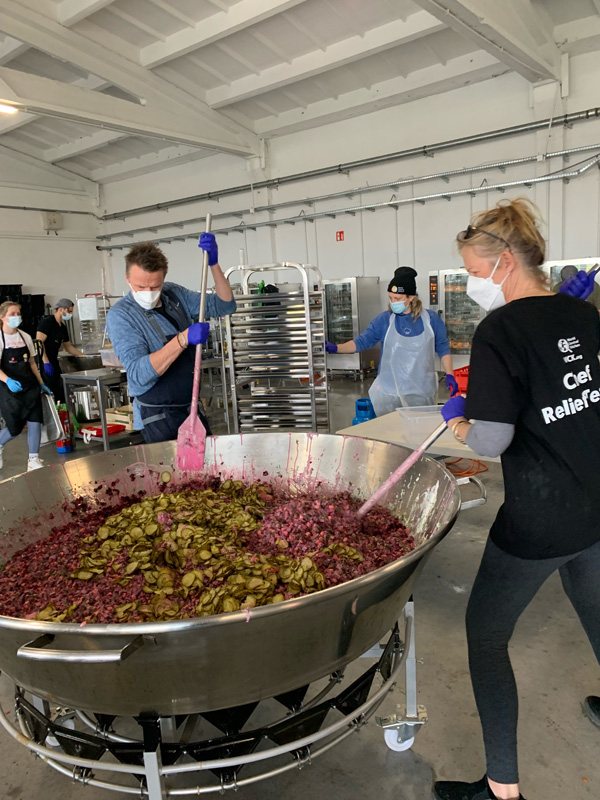
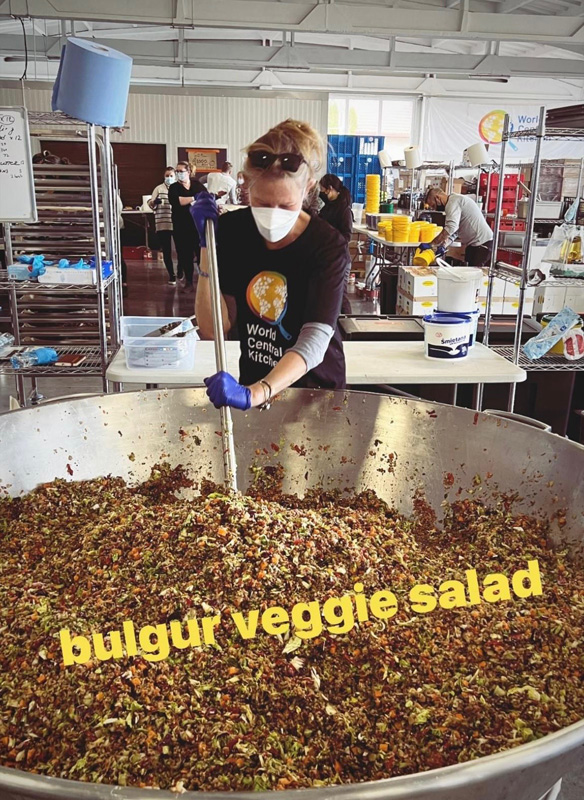
What has it been like for you and the other volunteers to be in a war zone? How do you prepare for something you can’t even imagine?
I think emotionally it came naturally for me to go help in Poland because I always wanted to dive directly into using my cooking strengths for a higher, more meaningful arena. I also knew that when my boys were grown I would lean into the humanitarian sector and service. Also emotionally, I feel very uncomfortable feeling so helpless. I cannot sit idly when I see so much suffering; it makes me feel too uncomfortable to bear. In my new empty nest I knew the time was right to just get up and go and figure logistics out as I went. It worked amazingly well. Not to sound cliché, but listen to your heart and follow it when it comes to helping.
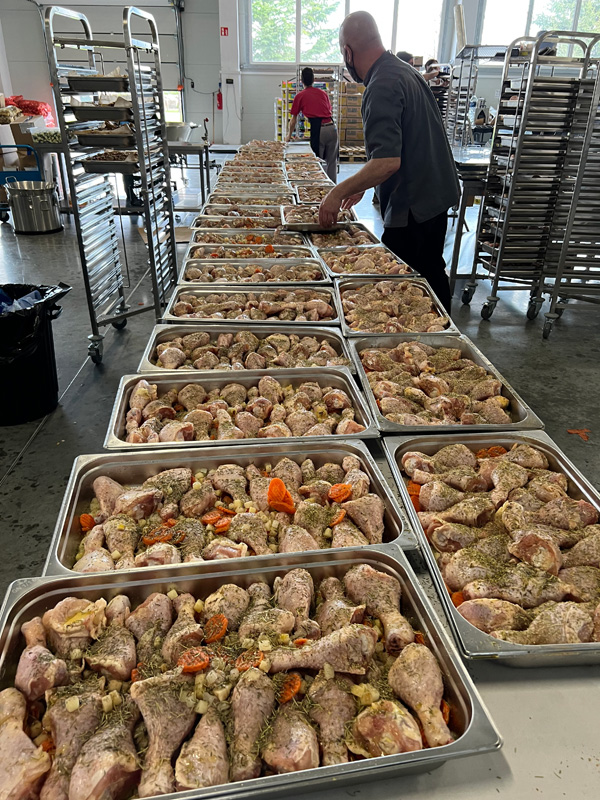
Have you met José Andres, the force behind World Central Kitchen, and if so, what was that like?
Yes, meeting Chef José in the kitchen where we were working was an honor. It was quick and unexpected but powerful for me. He’s a giant in my eyes. In many eyes. His work is like none other. His warmth, his passion, and authenticity is …I have no words except inspiring and beautiful. He has curated, with teams of really talented people, the best NGO or organization I’ve ever seen or known.
How do you think this experience will change you?
Yes, this absolutely changed me. Very powerfully. I’ve had a lot of loss, an unusual amount of loss in my life, and I think I’ve had some barriers I struggle with because of the losses. I know that this WCK experience has really motivated me to do what I want, to follow what feels right, what feels good, and make the most of my days, with zero regrets.
Cooking is all about the people. Food is a universal thing that really has power to bring everyone together. No matter what culture, everyone around the world eats together.


I couldn’t be prouder of my niece Rachel. I know that if Mary, Rachel’s mother and my sister, we’re still alive, she, too, would be bursting at the seams with pride. It’s a wonderful interview.
Auto correct changed were to we’re. Drat it all!
Rachel, I am impressed and moved to the core by your amazing dedication to help feed so many helpless Ukranian refugees fleeing their wartorn homeland. I wish I wasn’t so old (86) and had better knee joints so I could go and join you there. I am a very close friend of your aunt Patty and knew your mother also. I’ve also watched the picrures of your boys as they grew up into young men that Pat sent me. from time to time. I am sure they must all be proud of you and your mother would too, if she were alive today. Above all, you and your volunteering co-workers restore our faith in humanity and make your dynamically generous presence on this planet an inspiration to all of us to continue to support the extraordinary work of organizations like the World Central Kitchen which do so much in these emergencies. I will find a way to send a significant contribution to the WCK ; it’s the least I can do. Thank you for all you are doing there, Rachel. Love you, “Auntie Carmen” Professor Emerita, Regis University, Denver, Colorado, USA .
You are an amazing person !! Thank you for doing what we all should be doing.
Comments are closed.